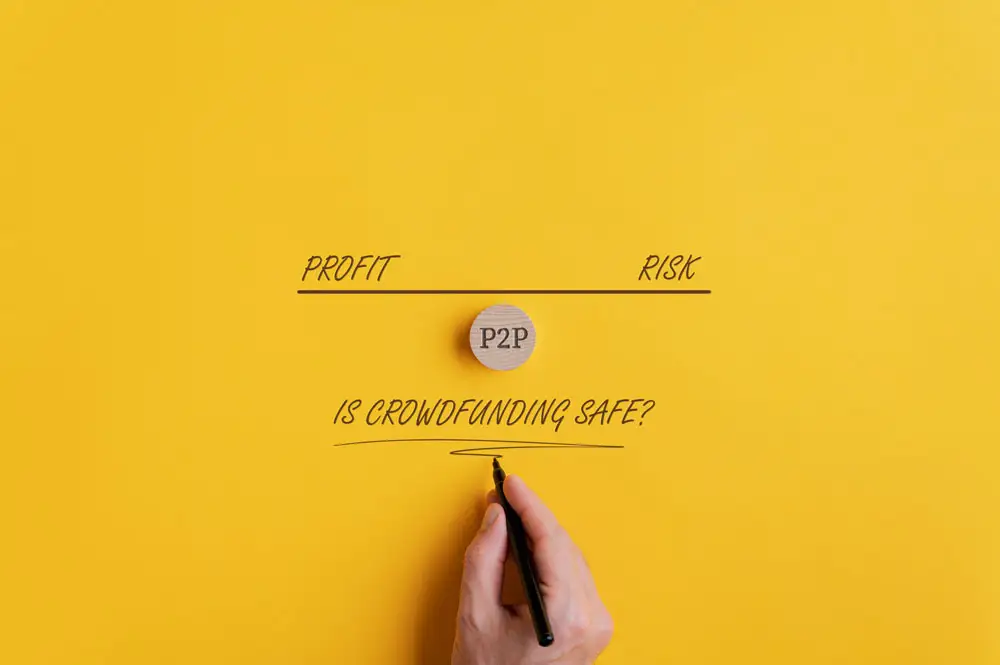WHAT IS CROWDFUNDING? AND HOW DOES IT APPLY TO REAL ESTATE?
Combining investors with a relatively low buy-in to invest in real estate projects through digital platforms, offering benefits of profitability versus relatively low risk.
Can two investment mindsets, one old and one new, coexist without driving each other mad? That's the pivotal question posed by crowdfunding in the real estate market, and one that seems to be answered in the affirmative. Crowdfunding meets the real estate sector and appears to be pairing up quite nicely, providing investors a new way to tap into the global real estate market

KEY TIPS
· Real estate crowdfunding allows developers to reach a broad spectrum of potential investors, tapping into social networks on technological platforms.
· One of the most significant advantages of investing in crowdfunding for real estate is that investors can commit much smaller amounts of capital for any individual property, sometimes as low as $500 or $1,000 USD.
· A drawback of investing with crowdfunding is that for most of these projects, you need to be an accredited investor.
· Primarily for wealthier investors (for now)
The real estate crowdfunding site, iFunding, estimates the combined market size to be over $11 trillion. At a recent industry conference in New York City, Markley Roderick, an attorney from Flaster/Greenberg PC and the conference's moderator, addressed new regulations linked to the Jumpstart Our Business Startups (JOBS) Act of 2012. These rules allow mostly affluent investors (with a net worth of $1 million or more) to gain direct access to the real estate market through crowdfunding or peer-to-peer lending (among other investment markets).
While the U.S. Securities and Exchange Commission is exploring ways to allow investors of all income levels to access the online real estate market, Roderick states that the wealthier investors are already venturing into crowdfunding sites like iFunding, Realty Mogul, CrowdStreet, and Fundrise. "If only a small percentage of them invest just a minor amount of their assets in real estate, the market will be worth trillions of dollars," Roderick explains.
Real Estate Crowdfunding
Crowdfunding employs social networks such as friends, family, and colleagues linked through social networking sites like Facebook, Twitter, and LinkedIn to spread the word about a new business and attract a wide range of individual investors. Crowdfunding has the potential to significantly expand the pool of potential investors from whom funds can be raised beyond the traditional circle of insiders, owners, family, and venture capitalists. Recent modifications to laws about who can invest in real estate in this way and how have paved the way for more crowdfunding.
Real estate industry groups are already hopping on the crowdfunding bandwagon, touting relatively low-risk access to the U.S. real estate market. "Crowdfunding for real estate isn't an entirely new phenomenon," the Commercial Real Estate Development Association reminds us in a statement made in the fall of 2011; "Numerous players have entered the field. Although each of these platforms has its niche and strategy, with different minimum investment levels, all are geared towards accredited investors who meet specific net worth and/or annual income requirements. In contrast, crowdfunding under the JOBS Act will open the field to many more smaller investors.

What are the pros and cons of crowdfunding for investors?
In a nutshell, it boils down to risk for both parties; specifically, how much information online investors want to absorb. According to the report, both real estate developers and investors can reap significant financial benefits through crowdfunding, and both can spread their risks.
Pros
· Investors can enter the real estate market with small amounts of money.
· Work directly with developers and real estate management and have a say in the process.
· They can choose which real estate projects they want to invest their money in.
· Access to countless projects, so choice isn't an issue.
· Lower investment sizes in a single project.
Cons
· Currently, one must be an accredited investor in the U.S.
· The risk of investment default (from real estate developers) is higher for crowdfunding compared to direct and peer-to-peer real estate investment financing.
· Lack of liquidity, such as the absence of a secondary market, limits easy access to selling opportunities for investors.
· Investment risks are the same as for any real estate investor. If the market goes south, an investor is likely to lose money.

Getting started with Real Estate Crowdfunding
Jillienne Helman, CEO of Realty Mogul, advises starting with a company that's been around and shows knowledge. "Firstly, work with a crowdfunding company that will last," she says. "This means well-capitalized. What scares me are the numerous crowdfunding companies spearheaded by two students fresh out of college that aren't well-capitalized."
Darren Powderly, co-founder of CrowdStreet.com, says due diligence is even more crucial in real estate than with other investments when working with a crowdfunding firm. "From the investor's standpoint, one needs to be cautious when researching the platforms where they're looking for investment opportunities," states Powderly. "Not all platforms are created equal, and multiple business plans are being tried out to capitalize on this emerging trend."
Powderly specifically advises investors to investigate the founders and top management of the crowdfunding platform or company to ensure they have a stellar reputation based on past business experiences. "Industry key expertise in finance, real estate, and technology is crucial to run a trustworthy and reliable platform," he adds. "Investors should lean towards platforms offering excellent customer service, not only during the fundraising process but even after the deal is fully funded and closed. Although there are over 50 platforms in some mode of operation, only half a dozen or so are emerging as leaders in the space. Investors should research various platforms and pick their top three based on their investment objectives and preferred user experience."
Once you've decided to invest in real estate this way, a major advantage is that you can allocate a smaller amount of capital to each of your crowdfunding investments. You can find different projects requiring as little as $500 or $1,000, facilitating diversification. Another perk of taking this route is that there generally aren't any investment fees, unlike the additional costs you'd expect with traditional real estate investments like closing costs or real estate agent commissions.
Transparency is crucial
Powderly advises looking for crowdfunding platforms and sponsors that acknowledge the risks while simultaneously providing an educational approach to risk management. “Most real estate crowdfunding platforms today only allow accredited investors as defined by the SEC,” he says. "Accredited investors are advised to invest amounts they are comfortable with, given their overall investment portfolio."
Another tip: only invest in deals from sponsors you trust and are confident will look out for your best interests through thick and thin.
"If an investor doesn't understand how their money is used, the investment's risk factors, and factors affecting the return on investment, they should seek advice from their trusted investment advisor or move the investment," adds Powderly. "There will be many other investment opportunities to choose from, so don't rush into an uninformed investment decision."
A professional real estate crowdfunding platform should give investors ample opportunities to communicate about the offering, including presenting directly to the sponsor of the particular property listing.
A new regulatory environment
In March 2018, the law was enacted to regulate fintech institutions, which includes crowdfunding platforms. This means crowdfunding activity is now a regulated and overseen activity by the financial authority in Mexico: the CNBV (National Banking and Securities Commission). This law was crafted with input from many, and crowdfunding platforms had the chance to intervene and voice our opinions during the drafting process, thanks to AFICO, Association of Crowdfunding Platforms.
What does this mean for you as an investor?
This new regulation provides certainty to investors and, in general, to platform users. Why? Because platforms offering crowdfunding services must now align with specific practices and rules, and we are monitored by the authority to ensure compliance.
The rules are many, but here we list the most important for you as an investor:
Minimum platform capital for continued operation.
The authority requires us to have a specific minimum amount of available capital, enough so if we ever have to shut down for any reason, we can continue operations at least until ensuring the tracking of investments made until leaving them in the hands of the corresponding parties (either the same investors or whoever the authority designates).
How to communicate opportunities, risks, fees, and services.
They impose guidelines to prevent misleading marketing while fostering clear contracts, transparent fees, avoiding the infamous "fine print", and clearly defining and exposing both the selection criteria of the opportunities presented and the risks of these operations.
Anti-money laundering.
To safeguard the integrity of the financial system and the platforms and investment opportunities, we are mandated to follow the strictest anti-money laundering practices. Although from our operations' onset we run anti-money laundering processes, with the new regulation, we'll have to add some extra steps for investors, which aren't comfortable but are necessary in front of the authority.
Information security.
The handling of our technology and the information processed and stored is of special concern to the authority. Part of the requirements they ask for includes reviewing contracts with providers, backing up information, controlling access to information, having a chief information security officer, having a disaster recovery plan, cyberattack prevention policies, and of course, response plans in case they happen.
Separation and proper handling of client vs platform resources.
It might seem obvious, but a very clear criterion is set, both physically and accounting-wise, for platforms to handle client money correctly and completely separate from the platform's operational money. At briq.mx, we've been doing this since day one, but some platforms didn't work this way.
If we look closely, all of this aims to take care of the industry but specifically its clients. The bottom line.
Crowdfunding in the real estate market promises to be revolutionary. It's just taking off but already draws significant interest levels from serious investors. While real estate crowdfunding is inherently risky, real estate investments can help diversify your portfolio and offer competitive returns.